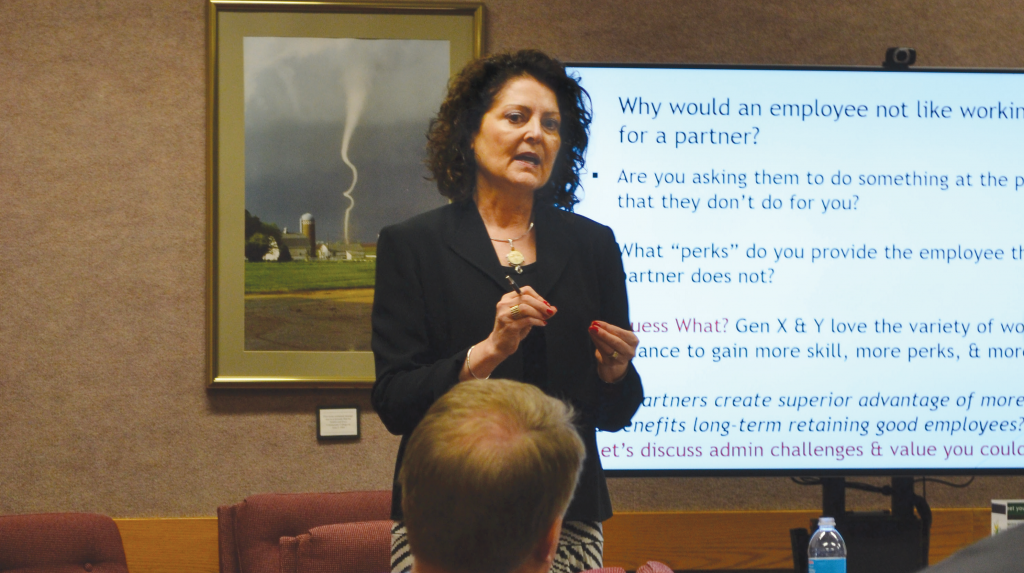Dau, former leadership coordinator for Calumet, Iowa-based Midwest Independent Soil Samplers (MISS), is now a private consultant. She also functions as one of Iowa’s chief advocates for “business labor partnerships.” The partnerships are cooperative agreements that essentially spell out how employees can be shared by companies that, on their own, each have only a partial year’s need for a skilled workforce of seasonal employees.
Properly managed, such marriages have the potential to be winners for everyone, advocates contend. Companies save on recruitment expenses, training costs, and unemployment claims while guaranteeing that quality seasonal workers will stick around. In turn, the employees get a taste of variety and, in most cases, better wages and benefits than they would have gotten from seasonal work alone.

“This is a far-reaching opportunity,” Dau said. “The partnership idea is very interesting to the next generation (of workers) because they like variety. They want to broaden their skill set.”
In a time when new workers are hard to find, smart and seasonally cyclical Iowa companies appear to be seriously studying the partnership idea—as well as other, different, ways of balancing demand so they can keep valuable employees on the payroll throughout the year.
Right now, the complicated requirements of company matchmaking make such relationships difficult to pull off. But difficulty is in the eye of the beholder.
“As the market gets tighter and tighter for skilled labor, you’re going to be seeing businesses look at every possible option,” said Bob Becker, a Spencer-based workforce advisor with Iowa Workforce Development (IWD), the state unemployment agency. “As time goes on, I think you’re going to be looking at all different kinds of arrangements.”
Founded in Minnesota in 1981, MISS was purchased by former employees in 2010. In 2012, the new owners hired Dau to rework the staffing and get away from an expensive, twice-yearly practice of recruiting overseas college students to work in the spring and fall. Instead, MISS moved to local, seasonal laborers in Iowa and the six other states where it operates. Then Dau started pondering ways to increase stability.
The result so far includes four partnerships that cover 10 of the 30 seasonal employees MISS hires in Iowa each year. Four more employees in Nebraska are shared between MISS and a fifth company, an organic farm.
All of those arrangements required complicated discussions up front. To succeed, partner companies need to agree early about items such as who pays what for payroll and insurance. (Midwest Independent Soil Samplers has a human resources computer system that is designed to accept input from outsiders; so MISS pays the workers, and partners pay MISS.) The shared employees need to understand that disciplinary problems on one job could threaten employment at the other. And everyone must agree on what will happen if one company is still in its busy period when the calendar calls for a worker to switch jobs.
“We are flexible,” Dau explained. “We are willing to work with our partners.”
In some cases, MISS has agreed to let shared workers drive its company-owned vehicles for work done on the partner’s job or to split the cost of safety equipment that’s required by a partner but not by the soil-sampling company.
 Such details are frequently where the difficulties arise, said Gary Ficken, president of Bimm Ridder Sportswear in Cedar Rapids. Bimm Ridder briefly shared employees with another screen printer after flooding damaged Ficken’s business in 2008. Subsequent talk of sharing was stifled by legal questions, he said.
Such details are frequently where the difficulties arise, said Gary Ficken, president of Bimm Ridder Sportswear in Cedar Rapids. Bimm Ridder briefly shared employees with another screen printer after flooding damaged Ficken’s business in 2008. Subsequent talk of sharing was stifled by legal questions, he said.
Complications such as the insurance question are thorny but ought to be solvable. “To me, it should be a win-win for everybody,” Ficken said. “Unfortunately, we just haven’t found an overly willing partner.”
Dau said MISS, despite paying benefits to shared employees and making various accommodations to partners, still saves money in comparison to the cost of recruiting and training new workers each season. Partners likewise benefit via access to quality employees. The only problem appears to be finding enough.
“I would say it’s a creative thing that we’ve been piloting, but it just hasn’t worked out,” said Jill Bidwell, human resources manager at Danfoss Power Solutions, a mobile hydraulics company with a plant in Ames and one employee that it shares with the soil sampling firm. “It’s been a successful pilot. We just haven’t been able to expand it with MISS.”
Some partnerships are complicated by an exception in Iowa law that doesn’t require unemployed workers to search for new jobs if they’re the victims of seasonal layoffs. (Some employees seem to prefer a few months of leisurely unemployment each year to life as a shared worker.)
For Danfoss and MISS, the main issue has been geography. Midwest Independent Soil Sampling has employees throughout the state. But right now (this may change with future MISS recruitment efforts), there simply aren’t enough workers who live close enough to Ames to make a shared job there practical.
Bidwell said Danfoss will happily pursue labor partnerships in the future, but the cost of complexity currently exceeds the benefit. “There simply aren’t enough hours in the day” to deal with the complications on a worker-by-worker basis, she said.
Iowa Workforce Development currently provides a host of targeted resources to help employers find skilled workers. But IWD’s Becker said the state currently has no plan to launch any kind of workforce matchmaking system. (Although IWD did host an informational meeting for companies about the topic last fall.) Becker acknowledged that business labor partnerships might benefit Iowa in general, since fewer seasonal layoffs means fewer seasonal unemployment claims.
“We wouldn’t necessarily be looking to do that,” he said of a possible IWD role in matching companies. “But I could envision a way where something like this could be done by the temp agencies. They could get on the front side of the problem, instead of the back side of the problem.”
Dau sees the predictability of shared employees as a key benefit over temporary workers. With a partnership, she stresses, “you’ve got a guaranteed quality person coming from our company.”
Change in how Iowa approaches employment is inevitable, Becker believes.
“As Baby Boomers start to exit the workforce, you are going to start looking at solutions you never thought you’d be looking at,” he said. “You may need to do some things with mechanization. You may need to recruit and train all sorts of populations that you never would have looked at or thought of before.
“There are some huge challenges on the horizon.”
This article originally appeared in the Summer 2015 edition of CIRAS News. You can find the rest of this issue and more of CIRAS News on our website.